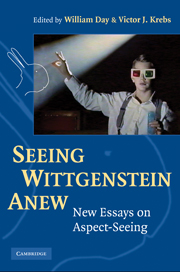Book contents
- Frontmatter
- Contents
- List of Contributors
- Acknowledgments
- Abbreviations of Wittgenstein's Works
- Seeing Wittgenstein Anew
- Introduction: Seeing Aspects in Wittgenstein
- I ASPECTS OF “SEEING-AS”
- II ASPECTS AND THE SELF
- II.1 Self-Knowledge
- II.2 Problems of Mind
- 7 (Ef)facing the Soul
- 8 Wittgenstein on Aspect-Seeing, the Nature of Discursive Consciousness, and the Experience of Agency
- III ASPECTS AND LANGUAGE
- IV ASPECTS AND METHOD
- Appendix: A Page Concordance for Unnumbered Remarks in Philosophical Investigations
- List of Works Cited
- Index
8 - Wittgenstein on Aspect-Seeing, the Nature of Discursive Consciousness, and the Experience of Agency
Published online by Cambridge University Press: 05 June 2012
- Frontmatter
- Contents
- List of Contributors
- Acknowledgments
- Abbreviations of Wittgenstein's Works
- Seeing Wittgenstein Anew
- Introduction: Seeing Aspects in Wittgenstein
- I ASPECTS OF “SEEING-AS”
- II ASPECTS AND THE SELF
- II.1 Self-Knowledge
- II.2 Problems of Mind
- 7 (Ef)facing the Soul
- 8 Wittgenstein on Aspect-Seeing, the Nature of Discursive Consciousness, and the Experience of Agency
- III ASPECTS AND LANGUAGE
- IV ASPECTS AND METHOD
- Appendix: A Page Concordance for Unnumbered Remarks in Philosophical Investigations
- List of Works Cited
- Index
Summary
We find certain things about seeing puzzling, because we do not find the whole business of seeing puzzling enough.
(PI 212f)Consciousness or awareness is possessed by at least a wide range of higher chordates. But genuine discursive consciousness is possessed – at least in its complex forms – only by human beings. Only human beings can, so it seems, be aware of seeing a given object as this or that, under one or another concept. The ability to be thus aware informs our perception, giving it both a judgmental character and a relation to self-consciousness. We typically see or hear that x is F, over and above simply taking in sensations. There is for any one of us always the potential to step back from our conceptually structured, judgmental perceiving so as to become explicitly aware that it is I who have judged that x is F (rather than, say, G). This openness to awareness of one's own role in judgmental perceiving further opens for us the possibility of a normative question arising. Am I correct so to have judged? This question does not arise for other higher mammals. They do not thus call their own being into question.
Historically, the apparently special character of human judgmental consciousness has motivated a variety of attempts to explain it, including at least Plato's theory of the immortal soul's ability to recollect eternal Forms, Aristotle's theory of nous as actively instancing essences both in us and in things, and Augustine's theory of the scintilla animae.
Keywords
- Type
- Chapter
- Information
- Seeing Wittgenstein Anew , pp. 162 - 180Publisher: Cambridge University PressPrint publication year: 2010
- 2
- Cited by

